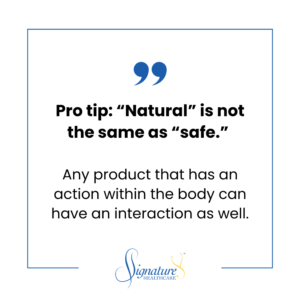Vitamins, Herbs, and Supplements: How to Decide, How to Purchase
Every week or so, it seems a certain pill or powder goes viral as the latest “wonder drug.” Whether you want to support nutrition, prevent a deficiency, lose weight faster, cure aches and pains, improve stamina, or grow more hair, dozens of commercial products compete for your attention.
Is there a clear benefit there? After all, for centuries, humans have touted the potential abilities of herbs and minerals and, in recent centuries, of vitamins and supplements.
But as individuals, how does each of us know:
- If we actually need a supplement
- Which ones will improve our health
- How much we should take
- Which ones have side effects or may interfere with our prescription medication
- How to choose from the 50,000–70,000 products on the market today
A Note About Supplement Efficacy
The best way to get vitamins and minerals into your system is to follow a healthy diet.
Vitamins and herbs can supplement that diet based on an individual’s unique needs. What works for one person may not be the best option for another. It’s important to work closely with a qualified medical professional who can help you make these decisions.
Patients often ask me: Are there vitamins, supplements, or herbs we should all take? Everyone’s different, so there’s no one-size-fits-all approach to, say, multivitamins or vitamin D. Both come in a wide variety of different products, often including other agents that aren’t necessarily right for you.
Or, you may hear that “everyone should take fish oil supplements” — yet there’s plenty of debate about that, and you’re better off eating fish.
I’m also commonly asked about the value of products containing turmeric, coenzyme Q10, glucosamine, and chondroitin for joint aches and pains, as well as several other items popularized in the media.
How to Decide What to Buy
So, when you’re perusing a catalog or store shelf loaded with vitamin, herb, and supplement options, how can you genuinely make a good decision about what to buy?
A more prudent move is to note the products you’re interested in, then bring the list to your pharmacist, doctor, or, ideally, your integrative medicine practitioner. Your chosen healthcare professional can review each product with you and evaluate whether its ingredients will support your health needs.
Pro tip: “Natural” is not the same as “safe.” Any product that has an action within the body can have an interaction as well. Side effects can result from vitamins, supplements, and herbs.
We carefully recommend product choices based on an individual’s unique circumstances, strengths, and vulnerabilities. For instance, if a patient takes a blood thinner, it’s important to be cautious with products that may thin the blood as a side effect, such as fish oil, ginkgo, and vitamin E.

Where to Purchase
Once my patients know what sort of product they need, they wonder where to buy it. “So many products look identical. Is it safe to buy online — say, on Amazon?”

Don’t purchase vitamins or botanicals from platforms like Amazon, where sellers may peddle counterfeit or adulterated products. To be safe, when you’ve worked with your doctor to identify the type of product and ingredients you need, purchase it:
- Directly from the product’s manufacturer
- From a trusted third party that specializes in selling a variety of high-quality vitamins, supplements, and herbs from different companies, such as The Vitamin Shoppe
Pro tip: Don’t stick with a single manufacturer for everything you buy. Just because a particular lab makes a great vitamin D doesn’t mean they make good CoQ10, glucosamine, or fish oil products. Again, your doctor or pharmacist can help you identify a good source for the items you need.
If you regularly take vitamins or supplements, invest in a membership with Consumer Lab, an independent entity that assesses supplements’ efficacy and safety. Independent guidance about product quality is invaluable.
Actively Participate in Your Care
Patients may do well as passive recipients of care, but as an integrative medicine practitioner, I encourage them to be actively engaged in their own health and wellness. Let’s discuss the result you’re looking for, then chart a path together.
My patients often contact me with ideas and ask for my advice or opinion. Because most of them take an active interest in their health and frequently do their own research, I guide them to websites where they can learn more. We can also review resources like the Consumer Lab site together.
For busy patients who have less time in their day to research, I highlight product information they may want to consider. This way, they may try one or two products rather than blindly sampling 10 different ones. We give it a few weeks and see how you’re responding, then adjust accordingly.
It’s up to the individual — there’s freedom in every approach. After all, healthcare is about dynamic interactions between patients and doctors.
Final Thoughts
The concierge model of care encourages a deep relationship with your physician, and the doctors and staff at Signature Healthcare are among the best in the region. As a team, we have the time to get to know you and to understand your goals and preferences, which sets you up for long-term health and wellness success.
That’s the kind of healthcare everyone should have access to.
Want to know more about integrative medicine or, more specifically, supplements and botanicals? I’m happy to answer your questions.

Dr. Russ Greenfield
Dr. Greenfield was among the first physicians to train under the direct guidance of Dr. Andrew Weil and has been practicing Integrative Medicine for over 25 years. He is Board Certified in Emergency Medicine and Lifestyle Medicine.
Get the latest News
Join the Signature Healthcare Newsletter to get the latest articles, resources, and news delivered directly to your inbox.


